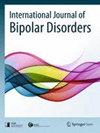The perceived social support of parents having bipolar disorder impacts their children’s mental health: a 10-year longitudinal study
IF 3.5
2区 医学
Q2 PSYCHIATRY
引用次数: 0
Abstract
The offspring of parents with bipolar disorder (OBD) are at higher risk of developing psychopathology than the offspring of parents with no affective disorder (control). In addition to genetic predisposition, childhood adversity and a stressful family environment are important risk factors for the OBD. Protective factors in parents, such as social support and coping strategies, may buffer the effects of stress on at-risk children. This study tested whether parents’ social support and coping style attenuated the link between risk status (OBD vs. control) and psychopathology in offspring. During offspring’s middle childhood, parents underwent a diagnostic interview and completed social support and coping style questionnaires. Sixty-nine OBD (39 female) and 69 control (29 female) offspring between ages 13 and 29 completed a diagnostic interview approximately 10 years later. Parents’ social support satisfaction moderated the link between offspring risk status and their development of substance use disorder (SUD) symptoms (F(1,131) = 5.90, p = .017). Parents’ social network size moderated the link between offspring risk status and their development of anxiety and depression symptoms in an unexpected direction (F(1,131) = 5.07, p = .026). No effects of parents’ coping style were found. Among the OBD, having parents with greater social support satisfaction and, unexpectedly, a smaller social network buffered their development of SUD and depression and anxiety symptoms by early adulthood. Parents’ social support may thus have a protective function for children in these high-risk families.双相情感障碍父母的社会支持感知对子女心理健康的影响:一项为期 10 年的纵向研究
父母患有双相情感障碍(OBD)的后代比父母没有情感障碍(对照组)的后代患精神病理学的风险更高。除了遗传易感性之外,童年时期的逆境和紧张的家庭环境也是躁郁症的重要风险因素。父母的保护性因素,如社会支持和应对策略,可以缓冲压力对高危儿童的影响。本研究测试了父母的社会支持和应对方式是否会减轻风险状况(OBD 与对照组)与后代心理病理学之间的联系。在后代的童年中期,父母接受了诊断性访谈,并填写了社会支持和应对方式问卷。年龄在 13 岁至 29 岁之间的 69 名 OBD 患者(39 名女性)和 69 名对照组患者(29 名女性)的后代在大约 10 年后完成了诊断性访谈。父母的社会支持满意度调节了后代的风险状况与其药物使用障碍(SUD)症状发展之间的联系(F(1,131) = 5.90, p = .017)。父母的社会网络规模以意想不到的方向调节了后代的风险状况与其焦虑和抑郁症状发展之间的联系(F(1,131) = 5.07, p = .026)。没有发现父母应对方式的影响。在 OBD 患者中,如果父母的社会支持满意度较高,而社会网络较小,那么到成年早期,他们的 SUD 以及抑郁和焦虑症状的发展就会得到缓冲,这一点出乎意料。因此,父母的社会支持可能对这些高危家庭的儿童具有保护作用。
本文章由计算机程序翻译,如有差异,请以英文原文为准。
求助全文
约1分钟内获得全文
求助全文
来源期刊

International Journal of Bipolar Disorders
Medicine-Psychiatry and Mental Health
CiteScore
6.70
自引率
5.00%
发文量
26
审稿时长
13 weeks
期刊介绍:
The International Journal of Bipolar Disorders is a peer-reviewed, open access online journal published under the SpringerOpen brand. It publishes contributions from the broad range of clinical, psychological and biological research in bipolar disorders. It is the official journal of the ECNP-ENBREC (European Network of Bipolar Research Expert Centres ) Bipolar Disorders Network, the International Group for the study of Lithium Treated Patients (IGSLi) and the Deutsche Gesellschaft für Bipolare Störungen (DGBS) and invites clinicians and researchers from around the globe to submit original research papers, short research communications, reviews, guidelines, case reports and letters to the editor that help to enhance understanding of bipolar disorders.
 求助内容:
求助内容: 应助结果提醒方式:
应助结果提醒方式:


